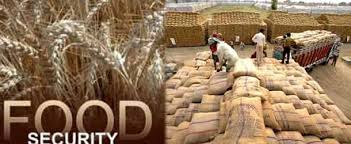Why neither Congress nor Indian economy may benefit from Food Security Bill, Congress, Indian economy, Modi, Food Bill, Narendra Modi, Food security bill, Latest news, latest and political news, political news, latest and breaking news breaking news.
- Details
- Category: National Political News
- Last Updated: Thursday, 22 January 2015 20:47
| Why neither Congress nor Indian economy may benefit from Food Security Bill. |
|
Congress spokesperson Abhishek Manu Singhvi defended the landmark Food Security Bill, saying “the perfect can’t be the enemy of the good”, but plenty of questions still hung in the air over the impact the bill will have and whether it will turn out to be popular politics but poor economics. Singhvi was speaking on CNN-IBN during a debate over the bill that also featured MPs BJ Panda and Naresh Gujral, author Shankkar Aiyar and professor Sandeep Shastri from Lokniti. For Singhvi, and therefore the Congress, the bill was simply an extension of the promises the party had made in its election manifesto. All parties, he argued, are naturally in the business of passing laws that are going to get it popularity and support. “We are prepared to take the hit, suffer the consequence or take the benefit of it,” Singhvi said. He also pointed out that the bill’s critics can’t have it both ways in claiming the bill is anti-national and will hurt the country and yet it is a populist measure that will garner the party a groundswell of support. The country might be going through bad times, and might have to go through them for a little longer, but Singhvi said it was a mistake to blame it all on the Food Security Bill. Besides, almost every party had voted for it in the Lok Sabha, so they should not now be claming the bill was flawed. Gujral, the Akali Dal MP and Panda, the MP from Orissa, both claimed that the bill was an example of the government living beyond its means and in the process, threatening the financial well being of the country. Gujral called it “a brazen attempt to cheat the poor people of this country,” because the bill was just window dressing and would actually give BPL families less than they were already entitled to under existing schemes. But he also admitted his party did not vote against the bill because they could not take the risk of being seen as anti-poor. Panda’s party, the Biju Janata Dal, did vote against the bill said he thought it would do more harm than good. While he admitted that his state also had a food security bill that the party touted, the difference was one of degree. . “You have to balance some degree of populism with fiscal conservatism,” he said. The UPA government, he argued, had failed to find that balance with the Food Security Bill. Shankkar Aiyer, the author of Accidental India: A history of the nation’s passage through crisis and change, also opposed the bill on the grounds that the country was not financially healthy enough to absorb the expenditures it requires. While revenues have grown four times over the last nine years, he pointed out that the fiscal deficit has grown five times, borrowing has grown seven times and internal debt has grown 10 times. In effect, he said, the bill was an example of the “public finance of private political ambitions”. Professor Shastri was not convinced the bill would be a political gamechanger either because it would still take months before the bill would start being implemented and so voters would not have enough time to evaluate it and therefore might be too little, too late. “Can the Food Security Bill arrest the general sense of insecurity there is in the country?” he said. For Aiyar, it was simple – the UPA government had mismanaged the economy, with or without the bill. “The problem really is that the economy has been a train wreck much before the FSB arrived at the station,” he said. Singhvi, though, stuck to his guns. “This whole system is give and take,” he said. “You go to the people with a program and you come back with votes if the program is good enough. source:http://www.firstpost.com |



